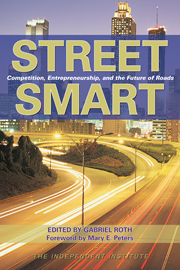What is the appropriate response to Secretary of Transportation Ray LaHood, who as General Motors prepared to file for Chapter 11 bankruptcy protection declared that he wants to “coerce people out of their cars”? One might be inclined to dismiss these words as overkill—except for recently introduced legislation by some congressional heavy-hitters that would take us down this road.
First there was the “Federal Surface Transportation Policy and Planning Act of 2009,” introduced in May by Jay Rockefeller (D., W.Va.), chairman of the Senate Committee on Commerce, Science and Transportation, and Frank Lautenberg (D., N.J.), chairman of the Subcommittee on Surface Transportation. Next, in June, came the “Surface Transportation Authorization Act of 2009,” introduced by James Oberstar (D., Minn.), chairman of the House Committee on Transportation and Infrastructure.
Messrs. Rockefeller and Lautenberg aim to “reduce per capita motor vehicle miles traveled on an annual basis.” Mr. Oberstar wants to establish a federal “Office of Livability” to ensure that “States and metropolitan areas achieve progress towards national transportation-related greenhouse gas emissions reduction goals.”
What does this mean? Most travel is not for its own sake. So reducing the total miles traveled—whether the length or number of trips—means people would have to reduce the activities they want and need to do. People would be “coerced,” in effect, to live in less desirable places or work in less desirable jobs; shop in fewer and closer stores; see their doctor less frequently; visit fewer family members and friends.
There are three likely ways this could work. The cost of travel could be increased by raising the prices of vehicles or fuel; travel time could be increased by not expanding the highway system; or superior alternatives to the private car could be developed. The most likely way to increase the cost of travel would be by increasing fuel taxes perhaps to as much as $4 per gallon, as some have suggested.
Allowing congestion to increase travel times would be politically easier. In the name of “multimodal planning,” for example, road-use taxes could be diverted, as Messrs. Rockefeller and Lautenberg suggest, to “increase the total usage of public transportation.” But public transportation (where it’s available) typically takes twice as long as automobile travel, so it’s not practical for many Americans.
Moreover, public transportation (passenger rail services, subways, buses, light rail) requires heavy subsidies, while roads mostly pay for themselves through fuel taxes. Our roads would be even more self-sustaining if 20% of the federal fuel tax were not already diverted to public transit from the federal Highway Trust Fund. Messrs. Rockefeller, Lautenberg and Oberstar want to grab even more money from the trust fund.
Americans have always valued their independence and mobility. One way to reassert their rights would be to abolish the misnamed Highway Trust Fund, which finances highway construction and maintenance. Let the states decide what roads they need and how to finance them. The present system expires on Sept. 30 unless Congress reauthorizes it. Let it die.
Sen. Kay Bailey Hutchison (R., Texas) has in this regard introduced the “Highway Fairness and Reform Act of 2009,” which would explicitly allow states to opt out of the federal financing system. A companion bill has been introduced in the House.
If a significant number of states opted out of the federal system, it would collapse and responsibility for roads would revert to the states. The vast majority of road users would benefit from such a change. And, if “livability” standards were deemed desirable, local preferences would determine them, rather than federal “greenhouse gas emissions reduction goals.”








